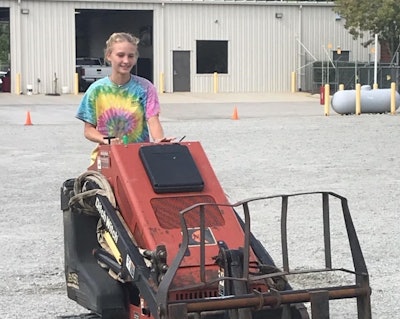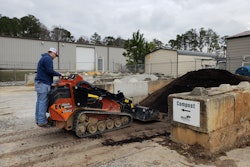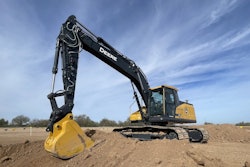
Over the past few days, we heard from a couple of voices from the incoming green industry workforce on matters such as work ethic and green industry knowledge.
Now it’s time to take a look at what green industry professionals and business owners can do to make sure the younger generations know about and are interested in pursuing these types of careers.
Drawing them in
According to Caitlin Clineff, recruiting specialist and company ambassador with Myatt Landscaping Concepts, changing perceptions starts with getting to the root of why this industry is viewed negatively and requires actively working to put more positive impressions and information out into the world. 
“The heart of the issue is how our industry is perceived in today’s society,” she says. “The only way to change that is for us to do something about it ourselves, and the key timeframe to be reaching people to change their perception is in high school or earlier. We have to break out of these stereotypes and reinforce a new image in peoples’ minds.”
Once you have the attention of interested individuals, Clineff says it’s important to show the multitude of career paths available through the green industry, and she adds that it is equally important to show the public that jobs in landscaping aren’t limited to certain demographics.
When looking at the demographics of the green industry, it’s no secret that women in landscaping are, typically, underrepresented, which is why Clineff says she takes extra time to talk to interested females about the National Association of Landscape Professionals’ (NALP) Women in Landscape Network.
Clineff says this network is a new initiative that works to help promote landscaping as a viable career option for women, as well as provide resources and support networks to women already in the industry to help them achieve their goals and move into leadership roles.
“We at Myatt Landscaping are actively encouraging more young women to consider careers in landscaping because it’s not something they tend to hear about,” says Clineff. “We want them to know they have a lot to contribute, and the career paths in our industry are open to everyone.”
Clineff notes that the interns that have come through the doors of Myatt Landscaping have been pretty evenly split between both male and female.
“In our experience, male and female students have shown pretty equal interest in the green industry,” says Clineff. “We’ve been fortunate that so far, we have had equal numbers of male and female interns, which helps us reach more students when they all go back to school and share their experience with their classmates.”
Along with educating students on how they can make a comfortable living working in the green industry, don’t forget that it’s also important that they know the other non-monetary benefits that can accompany this line of work.
“Our interns mentioned liking the hours better than the night hours of the restaurant industry, where some of them had also worked,” says Clineff. “One intern noted that she enjoyed the positive team atmosphere and being able to work outside instead of at a desk or in a restaurant/retail setting. All of them liked the higher pay rates we offer, compared to other jobs that hire recent high school graduates.”
Talking to students about the work you do doesn’t have to be an arduous or frightening task, and it all starts with setting up visits with your local middle and high schools, community colleges and universities.
To find out more about reaching out to local schools, colleges, FFA and 4H programs to talk about your landscaping company, click here.
Another idea to keep in mind when talking to students about the green industry is the wide variety of job areas they could potentially go into. Contrary to the old-fashioned and outdated belief that all landscapers do is mow grass, the green industry can offer students the chance to go into masonry and hardscape installation, design, irrigation, snow and ice removal, horticulture, lawn maintenance, public relations, recruiting, sales and even office management.
When gauging interest in these fields, take time to talk to students about which area piques their interest the most, why it’s of interest to them and what possible jobs they could get if they decided to focus on that area of interest.
“When I speak with students at career fairs, they always seem to be interested in design,” says Clineff. “I think it’s because that’s the most visible part of the landscape. Now, I always try to impress upon the students I meet that there are so many other interesting and rewarding roles within the landscape industry besides just design.”
How can you help?
Now comes the part you’ve all been waiting for…how can you personally help grow student interest in the green industry?
For starters, take time to go into your community and share your story. Talk to local gardening groups, 4H and FFA clubs and community volunteer programs about how you could partner with them to share your industry knowledge, as well as find ways to give back to your community.
“Sharing more information with your community about the opportunities for advancement within your green industry company is a great start to changing the negative perceptions that some people have that it’s not a true career,” says Clineff. “We want people to know that they can be very successful and have a lifelong career by working with us.”
Clineff says Myatt Landscaping takes great care to post salaries and hourly pay ranges on their job descriptions, and when talking to students about green industry careers, Myatt speaks openly about pay to give students a realistic look at what they could earn.
Clineff adds that the company is also very active on social media when it comes to praising and recognizing employee accomplishments and promotions, as this can help boost morale and help employees feel more valued in their workspace.
When it doubt, it can also prove effective to bring in students who have firsthand experience in the green industry to speak on what they’ve learned in their career journeys thus far.
“I think that involvement in this industry is vital, especially because so much of it relies on the natural resources that our planet provides us,” says Matthew Pendleton, a freshman in the Agriculture Institute at North Carolina State University. “It is crucial that we have people that know how to properly work with these resources for the best possible outcome. The up and coming generations are crucial for the future of the industry and it is vital that we continue to advocate and push more students to get involved.”
“I loved working in the green industry,” says Cameron Burcham, a senior at West Johnson High School in Benson, North Carolina. “At the end of a long, hard day, I felt satisfied in knowing I made a difference. It showed me what I was capable of doing and I think it’s a field more students should get involved in.”










